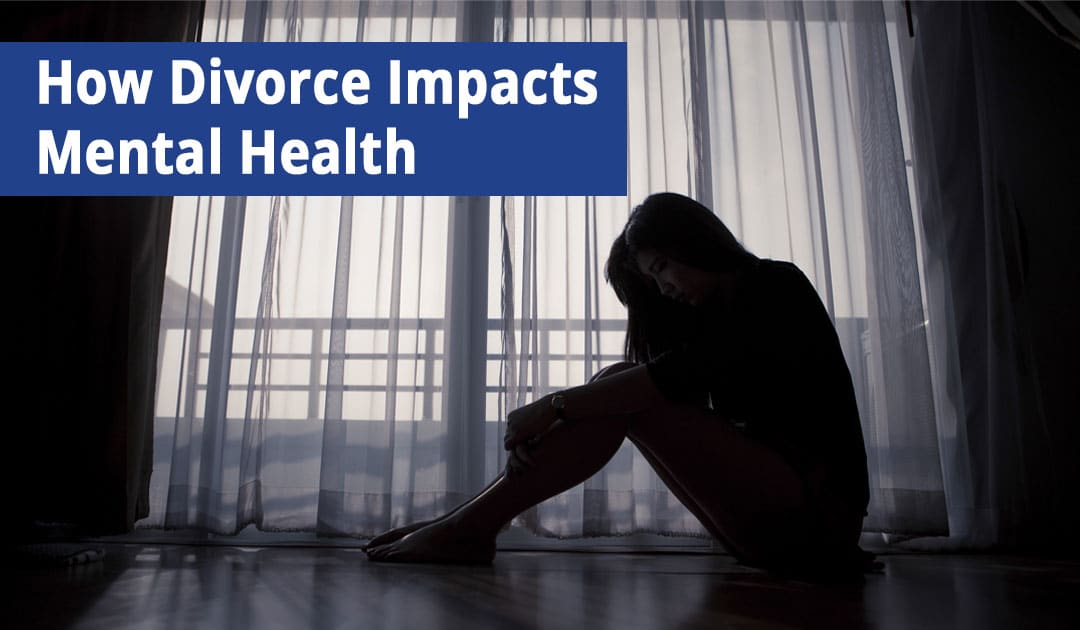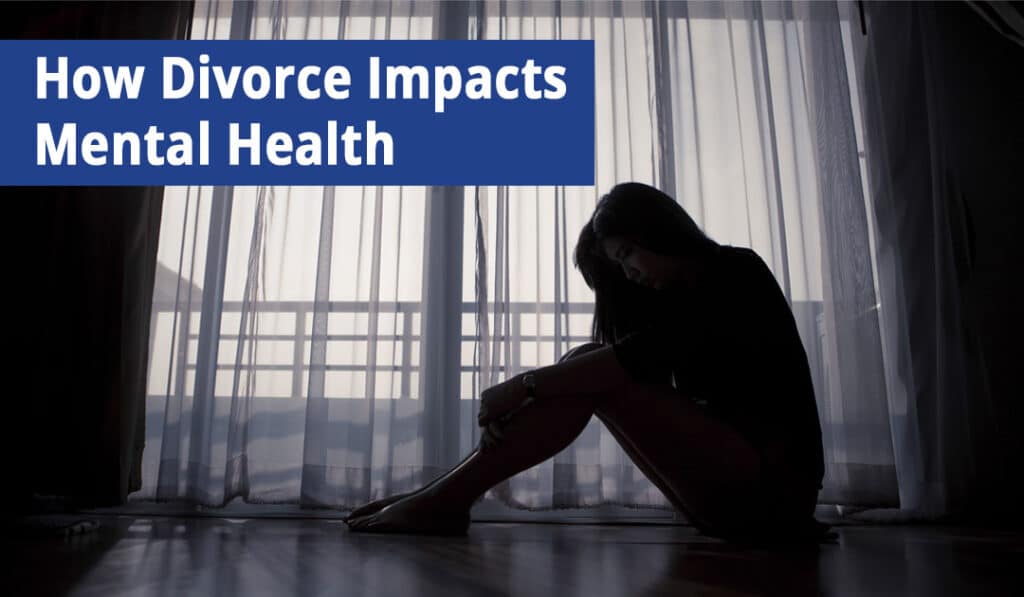How Long Island, NY Divorces Impact Mental Health

In recent years, awareness of mental health issues have increased across the nation. From anxiety and depression to eating and personality disorders and everything in between, people recognize that mental health is a serious and common issue affecting millions of people in the U.S. and around the world. In fact, according to the National Alliance on Mental Illness (www.nami.org), “43.8 million adults experience mental illness in a given year. 1 in 5 adults in America experience a mental illness. Nearly 1 in 25 (10 million) adults in America live with a serious mental illness.”
It stands to reason that going through a traumatic event like a divorce, can intensify or bring on symptoms of mental health issues. This means more people are asking questions about how divorce impacts mental health. What can people who are getting divorced expect emotionally? Here’s what to know and how to get the emotional support you need during this challenging time.
Research Shows Divorce Increases Anxiety, Depression & Alcohol Abuse
Research published by Cambridge University Press suggests that both divorce and legal separation put people at a greater risk for anxiety, depression, and alcohol abuse.
The study surveyed more than 2,000 people and was adjusted for factors like childhood trauma, financial hardship, and education. Overall, the research confirmed that divorce can have a significant and long-term negative impact on a person’s mental health.
What To Expect Emotionally When Getting a Divorce
Not only are divorces incredibly difficult financially and logistically – they’re also emotionally challenging. Regardless of which side of the divorce you’re on or whether you wanted it or not, you’re likely going to feel a range of both negative and positive emotions as you go through the process of dissolving your marriage.
During your divorce, you may:
- Lose the desire to engage in activities you once enjoyed
- Sleep more than usual or have a difficult time sleeping
- Eat more or less than usual or have difficulty eating
- Lose focus when completing important tasks at work
- Have a stronger desire to drink alcohol
- Not want to be around friends or family who may ask invasive questions
- Feel lonely even when you’re around people
- Not know how to sort through or experience your emotions
Mental health professionals suggest that you take some time to identify or name your emotions. Look for new ways to manage and talk through them instead of turning to alcohol, drugs, or other maladaptive coping mechanisms after divorce.
The Dangers of Drinking After Divorce
While drinking is more common after a divorce, it’s also risky for many reasons. Not only will your health be negatively impacted, you may also be putting your custody rights on the line.
If your ex-spouse finds evidence that you’ve been drinking excessively – with or without your children present – they could use this to file a motion seeking the removal of your custody rights. If drinking causes you to become more violent, your ex may also have sufficient grounds to take your children away on the basis of potential domestic violence.
Drinking is a form of self-medication that many people use to distract them from times of trauma. Instead of facing their problems head-on after a divorce, they drink their feelings about them away.
But by treating the root cause of these issues, you can avoid the situation becoming more serious and potentially losing income, custody rights, insurance, and more.
If you develop a drinking problem during or after your Long Island, NY divorce, you’re not alone. But it’s crucial that you get help as quickly as possible before your children or your future become impacted beyond repair. Consider going to a formal rehab center or an inpatient program that can also serve as a sort of “getaway” from the divorce and the people around you who remind you of it.
How To Get Qualified Mental Health & Legal Help
Being proactive about getting mental health and emotional support can help you better navigate going through your divorce or separation. A counselor or therapist can listen to you, identify toxic patterns, and give you tools to help you recover in a healthy way.
In situations where people need more help than what a counselor alone can give, a psychiatrist may be able to prescribe certain medications. These can reduce the symptoms of anxiety and depression and make it possible for people to function more normally during the emotional upheaval that getting divorced brings.
Call Hornberger Verbitsky, P.C. Today for Help with Your Divorce
Beyond counseling and medication support, you also need experienced legal help when you’re going through a divorce. The decisions you make now will affect you now and in the future, so you need to understand your rights and where to get qualified legal and mental health support when you need it.
Contact our office today for a free initial case consultation by dialing 631-923-1910. Our veteran Long Island, NY divorce lawyers are available now to provide you with comprehensive guidance and legal support when you need it most.
GET YOUR FREE CONSULTATION TODAY
Call 631-923-1910 or fill in the form below
Get your complimentary consultation and case evaluation with our experienced attorneys today.
Your attorney will describe the many options available and determine together which is the right solution for you. By the end of this conversation, we’ll all understand how we can best help you to move forward.
No Cost or Obligation
There is no cost or obligation for this initial consultation. It is simply an opportunity for us to get to know each other, answer your questions and learn if Hornberger Verbitsky, P.C. is right the right law firm for you. Give us a call at 631-923-1910 or fill in the short form below for your free consultation and case evaluation.
About the Author
Robert E. Hornberger, Esq., Founding Partner, Hornberger Verbitsky, P.C.
- Over 20 years practicing matrimonial law
- Over 1,000 cases successfully resolved
- Founder and Partner of Hornberger Verbitsky, P.C.
- Experienced and compassionate Long Island Divorce Attorney, Family Law Attorney, and Divorce Mediator
- Licensed to practice law in the State of New York
- New York State Bar Association member
- Nassau County Bar Association member
- Suffolk County Bar Association member
- “Super Lawyer” Metro Rising Star
- Nominated Best of Long Island Divorce Attorney four consecutive years
- Alternative Dispute Resolution Committee Contributor
- Collaborative Law Association of New York – Former Director
- Martindale Hubbell Distinguished Designation
- America’s Most Honored Professionals – Top 5%
- Lead Counsel Rated – Divorce Law
- American Institute of Family Law Attorneys 10 Best
- International Academy of Collaborative Professionals
- Graduate of Hofstra University School of Law
- Double Bachelor’s degrees in Philosophy, Politics & Law and History from SUNY Binghamton University
